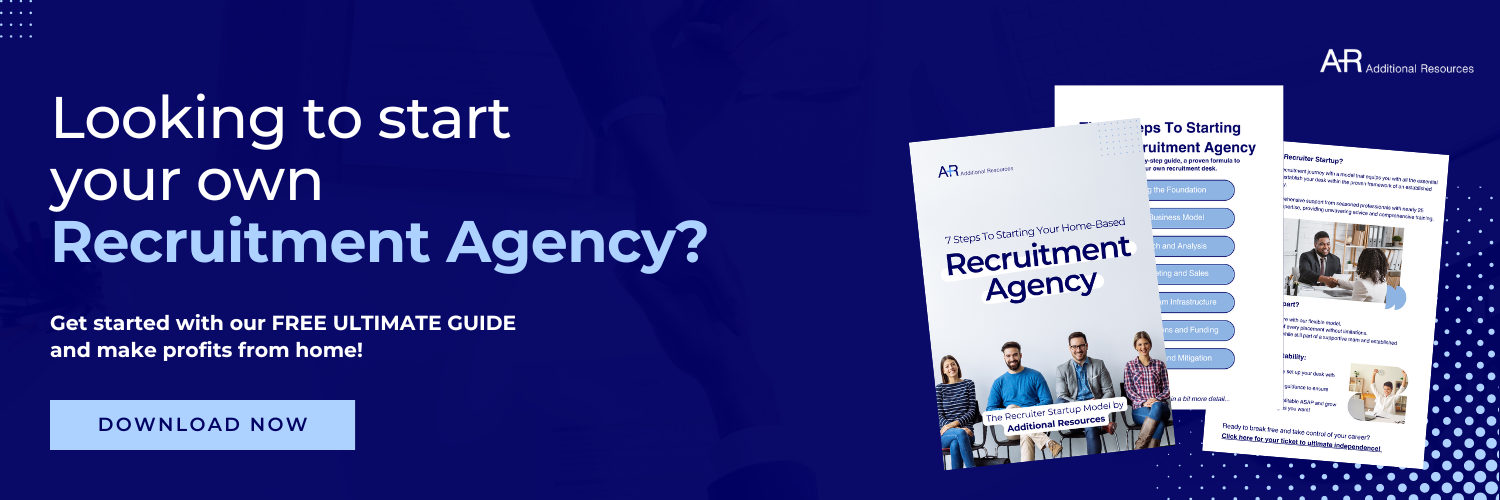Recruitment agencies play a crucial role in today’s job market. Therefore, understanding how recruitment agencies work can significantly benefit you if you’re a recruiter looking to work from home. In this detailed guide, we’ll delve into what recruitment agencies do, explore the franchise model’s recruitment process, and highlight the benefits of partnering with Recruiter Startup as a franchise recruiter.
What Do Recruitment Agencies Do?
If you’re considering joining the recruitment industry or are a prospective job candidate, you may often wonder, “How do job agencies work?” Simply put, recruitment agencies act as intermediaries between job seekers and employers. Their primary objective is to match the right candidate with the right job opportunity.

Job seekers can approach a recruitment agency to seek employment opportunities that align with their skills, qualifications, and career goals. On the other hand, employers rely on recruitment agencies to find suitable candidates for their vacant positions. So, if you’re wondering, “How do employment agencies work?” they handle the entire recruitment process, from sourcing candidates to conducting interviews and shortlisting the best-fit individuals.
The Role of Recruitment Agencies in the Job Market
Recruitment agencies play a vital role in the job market by bridging the gap between job seekers and employers. They have an extensive network of connections with various companies and industries, enabling them to access job opportunities that may not be advertised elsewhere.
Additionally, recruitment agencies often have industry-specific knowledge and expertise, allowing them to match candidates with the right skills and experience for the appropriate job roles. By leveraging their knowledge and network, recruitment agencies facilitate the hiring process and streamline the job search for candidates and employers.
How Does a Recruitment Agency Work?
Having understood their roles, let’s explore how a recruitment agency works.
The 7 Steps of the Recruitment Process
Working for recruitment agencies typically consists of the following stages:
- Job Brief: The agency meets with the employer to understand their requirements and job specifications.
- Sourcing Candidates: The agency searches for potential candidates through various channels, including its existing database, job boards, and social media platforms.
- Screening and Shortlisting: The agency conducts interviews, assessments, and background checks to evaluate candidates’ suitability for the job. It then shortlists the most qualified individuals.
- Interview Coordination: The agency sets up interviews between the shortlisted candidates and the employer, ensuring a smooth and efficient process.
- Reference Checks: The agency contacts the candidate’s references to verify their qualifications and work history.
- Offer Negotiation: If the candidate is successful in the interviews, the agency negotiates the job offer, ensuring a fair and mutually beneficial agreement.
- Onboarding: Once the candidate accepts the offer, the agency facilitates the onboarding process by assisting with paperwork and providing necessary information to the candidate.
Whether you work as an employee with a traditional recruitment firm/agency or a franchise recruiter with a Recruiter Startup, you’ll follow a similar process to onboard job seekers. The only difference is that you don’t have control over your schedule and earnings as an employee recruiter working at a traditional agency. But as a franchise recruiter, your earning is unlimited, and you have great flexibility and freedom with your time.
What Are the Advantages of Recruitment Agencies?
Partnering with a recruitment agency offers the following 5 benefits to employer companies/organisations:

- Time and Cost Savings: Recruitment agencies take care of the time-consuming tasks associated with hiring, such as sourcing, screening, and interviewing candidates. That frees up valuable time for employers to focus on other essential aspects of their business. Additionally, outsourcing the hiring process can be cost-effective compared to maintaining an in-house HR team.
- Access to a Wide Pool of Talent: Recruitment agencies have extensive networks and databases of qualified candidates. They can tap into this talent pool and attract candidates who may not actively seek job opportunities. That widens the pool of potential candidates, increasing the chances of finding the right fit for the job.
- Industry Expertise: Recruitment agencies specialise in specific industries or job roles. They deeply understand market trends, salary ranges, and industry requirements. This expertise allows them to identify the most suitable candidates for a particular job and provide valuable insights to employers.
- Confidentiality and Discretion: In some cases, employers may need to keep their hiring process confidential. Recruitment agencies can maintain a high level of confidentiality and discretion when working with both employers and candidates. This is particularly useful when filling executive-level positions or during sensitive company transitions.
- Long-Term Partnerships: Employer companies who build a strong relationship with a recruitment agency can enjoy long-term partnerships. As the agency becomes familiar with the company’s culture, values, and hiring needs, it can become a trusted advisor in the organisation’s talent acquisition strategy.
4 Advantages of Starting Your Own Online Recruitment Business
Embarking on the journey of starting your own online recruitment business offers a range of advantages that make it a compelling entrepreneurial pursuit, including:
- Flexibility and Autonomy: As an entrepreneur, you can set your own schedule, work with clients of your choice, and build a business that aligns with your vision.
- Cost-effectiveness: The online nature of the business eliminates the need for physical office space, significantly reducing overhead startup costs. This cost-effectiveness extends to marketing and advertising, as digital platforms offer affordable and targeted ways to reach potential clients and job seekers.
- Scalability: The scalability of an online recruitment business allows you to expand your operations without the constraints of traditional brick-and-mortar establishments.
- Sense of Fulfilment: Another advantage of starting your own online recruitment business is the opportunity to make a meaningful impact on employers and job seekers. This sense of fulfilment adds value to your entrepreneurial journey and reinforces the significance of your role in the recruitment ecosystem.
Understanding the Franchise Model for Recruiters
Recruiter startup offers a franchise model for recruiters looking to work online. This model provides a unique entry point into the online recruitment industry, offering a proven framework and support system for aspiring entrepreneurs. By becoming a franchise associate recruiter, you can leverage a successful recruitment company’s established brand reputation, operational expertise, and resources. In a nutshell, this model presents an attractive proposition if you’re looking to start your own recruitment business with the guidance and backing of an experienced franchisor.
3 Advantages of Recruiter Startup’s Franchise Recruitment Model
Here are 3 key benefits of the Recruiter Startup franchise recruitment model:
- Access to a ready-made business model and support network significantly flattens the learning curve and initial challenges of starting a business from scratch.
- Franchise recruiters benefit from comprehensive training, ongoing assistance, and a recognisable brand image that adds credibility to their recruitment services. This support system can be invaluable for individuals with limited experience entering the industry.
- The franchise model often includes access to a network of clients and candidates, providing a head start in building a client base and filling job vacancies. Recruiter Startup provides 2–5 job placement leads monthly, setting you up for success.
How Do I Apply for Jobs In Recruitment Agencies?
If you’re keen on working for a recruiting agency, here are 7 steps to follow:
- Research and select appropriate recruitment agencies specialising in your industry or desired job roles.
- Visit the agency’s website or contact them to inquire about their application process.
- Submit your CV and other required documents through their online application system or email.
- Tailor your application to highlight your relevant skills and experience for the specific job or industry.
- Be prepared for an interview with the agency, as they may assess your suitability for various recruitment positions.
- Once accepted, the agency will match your profile with suitable recruitment job openings and submit your application to potential employers.
- Stay in regular contact with the agency to receive updates on job opportunities and to provide any additional information or documents they may require.
If you think this 7-step process sounds tedious, you can skip the frustration by joining the Recruiter Startup franchise program. Following this path puts you in a position where you’re not constantly looking for jobs; it allows you to be your own boss with great earning potential (our recruitment franchisees earn about £40K–£100K per year).
Finding the Right Recruitment Agency in the UK
While several recruitment agencies exist in the UK, Recruiter Startup stands out in that we don’t operate based on the typical recruitment agency organisational structure. We specialise in providing the tools and software you require to work online or independently. By partnering with us, you can quickly get started in the recruitment business without the stress.

The success stories and testimonials from associate recruiters on Recruiter Startup prove the potential for growth and accomplishment in the online recruitment industry. By partnering with us as a franchise recruiter, you can create your own recruitment business and enjoy a thriving community, affordability, transparency, unlimited earning potential, and comprehensive support. Contact us to get started on your journey to success in the recruitment industry.
Frequently Asked Questions
What is the average recruitment fee in the UK?
The average recruitment fee in the UK charged by traditional recruitment agencies is around 20–30% of the candidate’s annual salary. However, it’s important to note that recruitment fees can vary depending on factors such as the industry, seniority of the role, and the specific agreement between the agency and the client. Negotiating and clarifying the recruitment fee structure and terms is always advisable before engaging with a recruitment agency.
How do I prepare for a recruitment agency interview?
To prepare for a recruitment agency’s interview, there are several steps you can take:
- Research: Learn about the agency, its clients, and the industries it specialises in. That will help you tailor your answers and demonstrate your knowledge during the interview.
- Know yourself: Reflect on your expertise and the organisation you want to work for. Be prepared to articulate your skills, experiences, and what you seek in your next employer.
- Practice interview questions: Research and rehearse answers to potential interview questions. Prepare examples that highlight your skills and achievements.
- Bring necessary documents: Bring multiple copies of your CV, a letter of introduction (if necessary), writing samples or a portfolio of your work.
- Prepare an elevator speech: Develop a concise summary of your recruiting expertise and gather evidence of your placements. That will help you confidently communicate your value as a candidate.
Can you just walk into a recruitment agency?
You can usually walk into a recruitment agency without an appointment. However, going by how placement agencies work, it’s generally advised to call ahead to ensure the agency is open and recruiters can assist you.
While some agencies allow walk-ins, it’s recommended to make an appointment to guarantee that a recruiter will be available to speak with you. Making an appointment can also help avoid delays or long wait times. Additionally, calling ahead lets you inquire about the agency’s specific requirements or any documents you may need to bring along.
Who pays recruiters the most?
The employer pays the recruiter the most, and not the employee. The typical way recruitment agencies make money is via compensation from the employer seeking to fill job vacancies. When the consultant successfully matches candidates with suitable positions, they earn a fee for their services, which is often based on a percentage of the candidate’s starting salary or a predetermined fixed amount agreed upon with the employer.
Conclusion
Embarking on a recruitment franchise career with Recruiter Startup presents an exciting opportunity for aspiring entrepreneurs to thrive in the dynamic world of talent acquisition. You can take your professional journey to new heights now that you know what recruitment agencies do. Join us in shaping the future of recruitment and unlocking your potential for success — contact us today to learn more!


